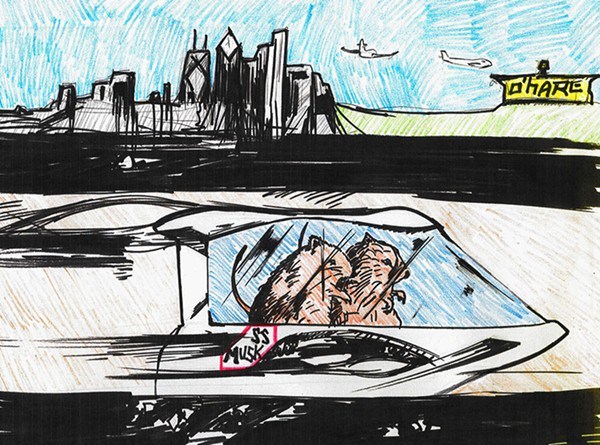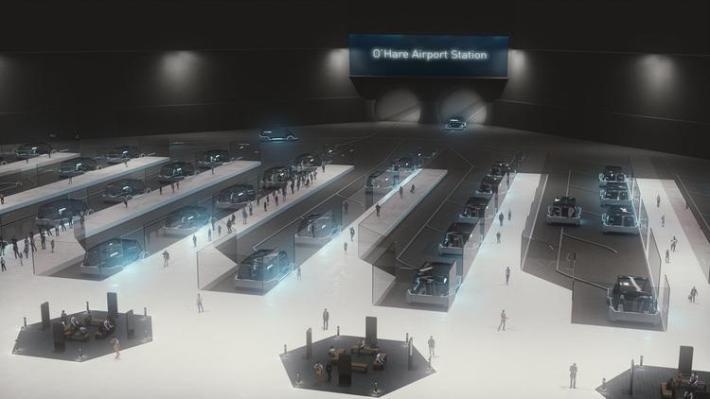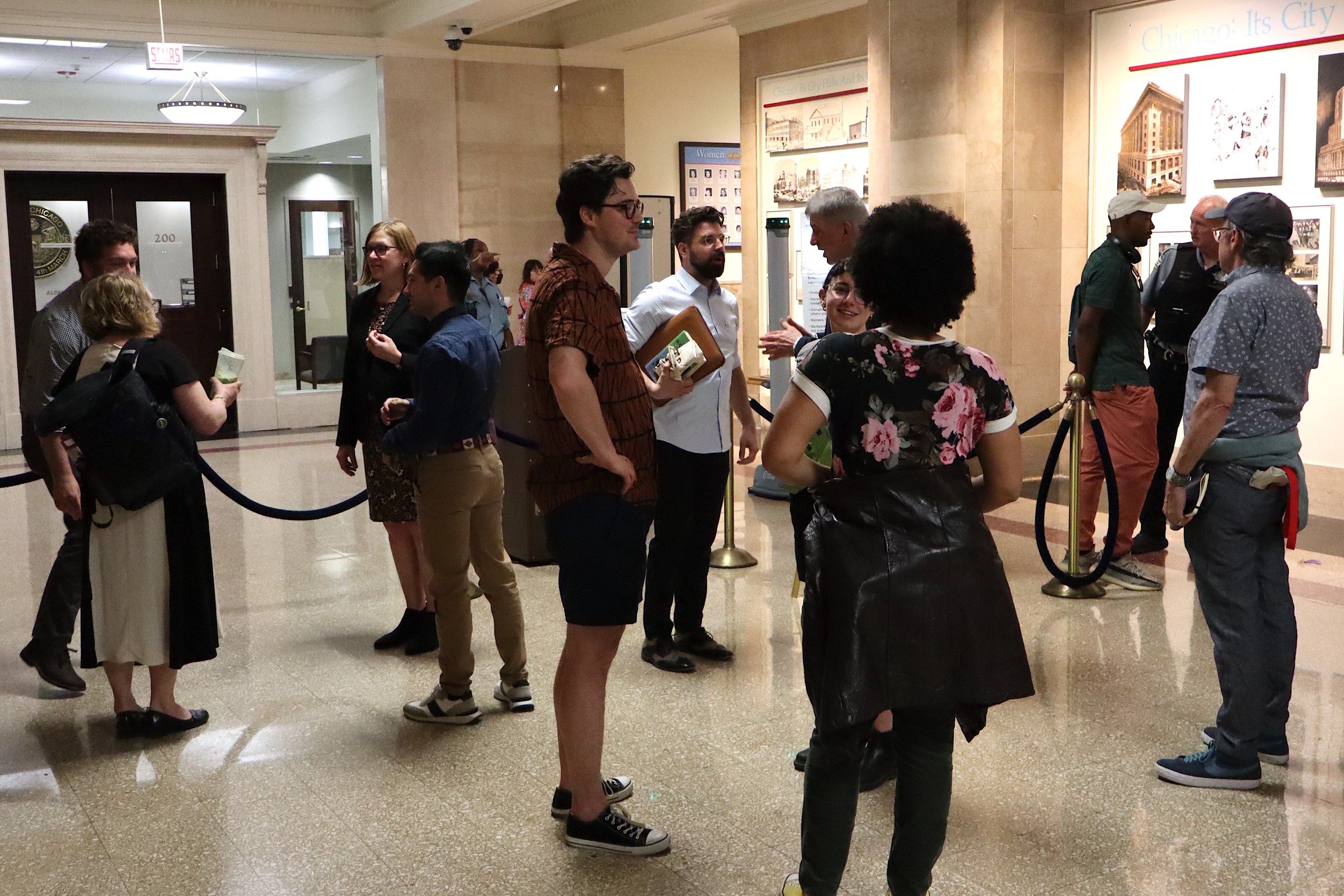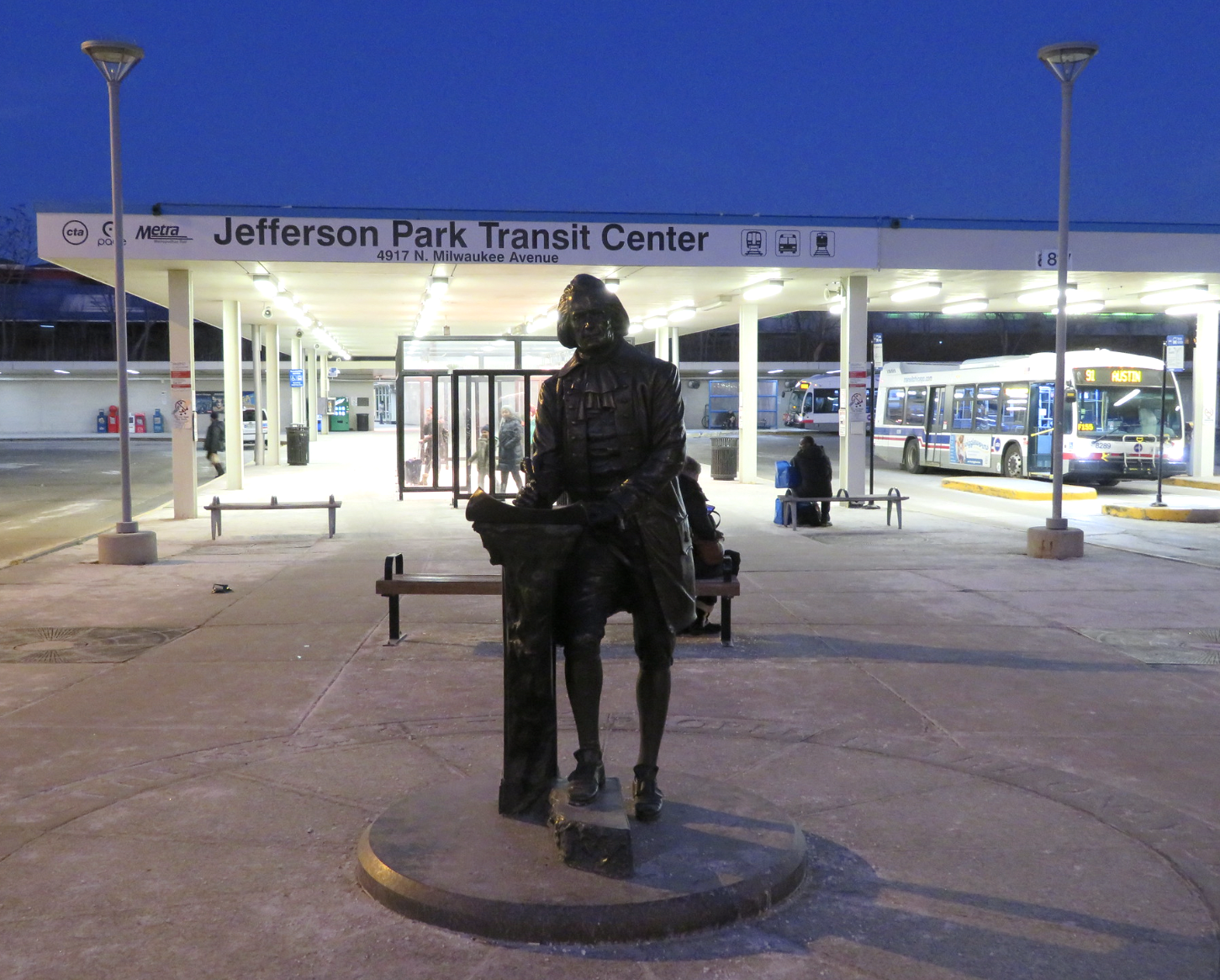CDOT Assures Us They’re Not Seeking Federal Funding for the O’Hare Express
10:08 PM CST on February 4, 2019

Artist’s rendering of the tunnel that Musk hopes to burrow under Chicago. Illustration: Jonathan Roth
On Friday we reported that the Chicago Department of Transportation, the city's lead agency working with Elon Musk on his O'Hare Express proposal, has asked the Chicago Metropolitan Agency for Planning to amend the its regional plan to add the project. That would make the Jetsons-esque scheme potentially eligible to receive federal funds and approvals.
Actual transit experts have almost universally dismissed Musk’s plan, which involves digging a tunnel from the Loop to O'Hare and shooting well-heeled travelers through it in pods at over 100 mph using "electric sled" technology. But Mayor Rahm Emanuel wants the express to be part of his legacy, so he’s pushing to get the contract inked before he leaves office this May.
The Chicago Tribune's Mary Wisniewski noted yesterday that time is running out for the city seal the deal before the February 26 mayoral election, or even the (likely) April 2 runoff. Wisniewski compiled quotes about the airport express from the major candidates, noting that most have either voiced opposition to the project or are are lukewarm to it.
One notable exception is former Obama chief of staff Bill Daley, perhaps the most business-friendly candidate, whose brother Richard tried and failed to build an airport express when he was mayor. Bill Daley stated that while he has some questions about the project's cost and fare structure, Chicago shouldn't be afraid to innovate. So barring a third Mayor Daley, it appears that Musk's plan is increasingly unlikely to happen.
But, at least until Emanuel vacates the fifth floor of City Hall, CDOT staffers are under orders to promote the O’Hare Express as a sensible and essential project, as transportation chief Rebekah Scheinfeld did in December in a Sun-Times interview, regardless of what they actually think of the scheme.
Today department spokesman Mike Claffey reached out to clarify what’s going on with the department’s bid to add the airport express to CMAP’s regional plan, called “ON TO 2050.” The city and Musk have repeatedly stated that no taxpayer money will be used to build the $1 billion-plus system. “We want to underscore that the O’Hare Express is NOT being submitted to CMAP for inclusion in the ON TO 2050 plan in order to seek federal funding,” Claffey said via email.
Rather, he said, the city wants the project included in the document because it is a major infrastructure project that is going through a National Environmental Policy Act review because it has the potential to impact a federal facility. That is, sections of the tunnel would pass beneath the federal Interstate system.

Claffey further emphasized the claim that the project won't use taxpayer money. “The request for qualifications clearly states: The project is to be funded solely by project-specific revenues (e.g., farebox revenue, advertising revenue, etc.) and financed entirely by the concessionaire.”
Our article pointed out that, in a memo to the CMAP board from CMAP staff who analyzed the O’Hare Express, the staffers cautioned that they can’t confirm the city’s claim. “Without examining the final contract document, [we're] unable to state with certainty that no public funds will be expended on the project.”
Claffey noted that CMAP hasn’t had a chance to examine the final contract because it’s still being negotiated. “Once the negotiations are complete, the contract will be publicly posted and submitted for consideration to the City Council, which will have the opportunity for a thorough review of the proposal.”
That raises the question: How much time is needed for a thorough review of the contract? Hopefully it will be significantly longer than that for Chicago’s disastrous parking meter deal, which Richard M. Daley pushed through City Council in a matter of days. (In her Sun-Times interview, Scheinfeld took pains to differentiate between that contract and the O’Hare Express, noting that the former sold off an existing asset, while Musk’s plan is supposed to create a new one.)
“It’s not like the O’Hare Express contract would be submitted to the City Council one day and then voted on the next,” a city official assured me this afternoon. They guessed that aldermen and the public will have about a month to review the contract, and noted that it will have to be approved by a City Council committee (they weren’t sure which one) before going before the full Council for the final vote.
I asked the official why taxpayers should have any faith that they won’t be on the hook if the airport express turns out to be a failure. After all, the CMAP memo noted that Toronto’s Union Pearson Express, which wound up requiring a heavy public subsidy, is a cautionary tale. And what happens if the erratic (to say the least) tech guru gets halfway through digging the tunnel and gives up? Or, in the unlikely event that he’s able pull off completing the network (including inventing the passenger pods), what if he can't turn a profit and shuts down operations, leaving the city with a white elephant?
Another city official promised that a surety provision in the contract, backed up by banks, would ensure that the city has the necessary funds to deal with such scenarios.
The CMAP memo addresses this issue:
While the city has stated that the contract will require that the [O'Hare Express] be returned to the city in the event of bankruptcy, this eventually could have positive or negative financial impacts. City officials have stated that, in either situation, the city would not carry the burden of repaying capital costs and would have no obligation to continue operating the asset. Absent the ability to review contract language, CMAP staff cannot independently confirm that public protections are in place.
Whether or not the city officials' assurances make you more comfortable with Musk's theoretical transit system, that may be a moot point, since it could be difficult to get a contract approved before Emanuel's successor has a chance to kill the project. If that happens, I'm guessing that more than a few city staffers, who currently have to act like this boondoggle is a good idea, will be relieved that they can stop pretending.
![]()
Did you appreciate this post? Consider making a donation through our PublicGood site.
In addition to editing Streetsblog Chicago, John writes about transportation and other topics for additional local publications. A Chicagoan since 1989, he enjoys exploring the city on foot, bike, bus, and 'L' train.
Read More:
Stay in touch
Sign up for our free newsletter
More from Streetsblog Chicago
They can drive 25: Residents, panelist support lowering Chicago’s default speed limit
While there's no ordinance yet, the next steps are to draft one, take a committee vote and, if it passes, put it before the full City Council.
One agency to rule them all: Advocates are cautiously optimistic about proposed bill to combine the 4 Chicago area transit bureaus
The Active Transportation Alliance, Commuters Take Action, and Equiticity weigh in on the proposed legislation.



